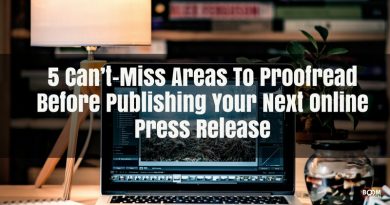Have you ever read a newspaper or magazine article and stumbled upon a spelling error? Have you ever come across a detail in an article on CNN.com or NYTimes.com and known it was inaccurate?
Chances are, these errors eroded your trust in the author. Anything that individual said from that point forward was slightly suspect, because if they leave glaring errors in their copy, what else might be wrong with it? That's a natural response, which is why you need to take great pains to make sure you don't commit the same goofs in your online press releases.
Since it's relatively inexpensive to publish news announcements online, a lot of people treat them with less care than they would if they were paying hundreds of dollars per release. But errors damage your credibility. In such a hyper-competitive environment, that's one mistake you can't afford to make. Today, we're going back to basics for a refresher. Here are 5 items to check before sending your press release into the world.
#1 – Spelling And Grammar
We've become lazy. In corporate America, spelling mistakes in emails are forgiven and overlooked. Spec documents can contain grammar gaffes without receiving a hint of feedback. Needless to say, our emails and texts to loved ones are rife with blunders that would make our 4th grade English teachers faint. We rely heavily on autocorrect and spellchecks to catch our errors, but those tools won't catch properly spelled words that aren't the correct in context. None of those things give us an excuse for allowing even a single spelling or grammar mistake to find its way into our press releases.
Fix it! After you write a new PR, proofread it. Double-check your work. Ask a third party to read it through prior to publishing. Don't rely on distribution service editors to clean up your mistakes either.
#2 – Dates And Names
If you're writing in Microsoft Word, most spelling and grammar mistakes will be picked up by the software. (Keep in mind, the software is not perfect. Also proofread manually.) Errors with dates and names are different. MS Word doesn't know if you mean October 17th or November 17th. It doesn't know whether you mean David or Davis. You need to check these details carefully.
Fix it! Before publishing your press release, validate that you're using the right dates. Make sure you're spelling names correctly. It's also a good idea to verify that the name of the person you're quoting was actually the person who made the statement in your quote.
#3 – Facts And Figures
We've all seen statistics that lead promotions. For example, a whitepaper from a drug company might start with “There is a 1% chance of survival past the first year for those with metastatic Stage IV pancreatic cancer.” It's a compelling way to introduce a topic since it generates interest and keeps people reading. But the statistic must be accurate to have a positive effect.
If you use inaccurate numbers in your press releases, you risk destroying your credibility. The reader will not trust you if your statistics are wrong.
You may be wondering how likely it is that someone will catch your errors. With Google, facts and figures can be checked in minutes. Someone who is an expert in the field you're discussing may be able to fact-check you simply from their own knowledgebase.
Fix it! Double-check your work. Cite the sources for your statistics in all instances, and when linking to that source, cross-check your stat.
#4 – Where Are Your Keywords?
In order for your news announcements to rank in Google, they need to include your keywords. What's more, your keywords need to be in the right places. These are easy details to forget, especially when you're concerned about writing a high-quality, accurate piece of news.
Fix it! Before hitting the “Submit” button, take a hard look at the visual preview. Make sure your keywords are in the body copy, and verify that your primary keyword is in the headline. Otherwise, your press release is unlikely to rank for those phrases, which will limit the link juice it passes to your site.
#5 – Are Links Pointing To The Right Pages?
One of the main reasons to take advantage of online press release distribution is to build links to your site. The more links you have, the better chance you'll have to rank for your main keywords. The problem is, when writing a news announcement, you're taking care to proof spelling and grammar, verify names and dates, and check facts and figures. With so much to demand your attention, it's easy to get turned around with your links.
The distribution service you use should allow you to insert two or three links into each PR. You should point them to different pages on your site, using appropriate anchor text for each one.
Fix it! Double-check these details before publishing your press release. Make sure the links are directing readers and search engine spiders to the right places. Click each link from preview mode to ensure that it goes to the right URL, and that the page loads properly.
Mistakes are easy to make and difficult to recover from. This is truer online than offline since content is immortalized by the search engines. Once you say the wrong thing, you can't take it back.
Time to do some proofreading!
Your Turn!
Have you ever published a news announcement only to realize it contained embarrassing bloopers? Did you misspell someone's name? Get a key statistic wrong? Or did you use “is” instead of “are,” making your PR sound silly? Share the details below. Remember, we're all friends here, and none of us are perfect!
About Author
Kim Garst
Kim Garst is a renowned marketing strategist and speaker who is trailblazing the use of artificial intelligence in digital marketing. With over 30 years of experience as an online entrepreneur, Kim helps entrepreneurs grow their business and authority online by using AI technology. She is leading the way with proven AI frameworks that help entrepreneurs build authority in their space.
She is keynote speaker and an international best-selling author of Will The Real You Please Stand Up, Show Up, Be Authentic and Prosper in Social Media.
Named by Forbes as a Top 10 Social Media Power Influencer, Kim is well-known for her skill to simplify complex technology and make the use of AI understandable for business growth. Her relatable, actionable advice helps guide new entrepreneurs to harness the power of AI to succeed in digital marketing. Kim is leading the way in combining human and technological skills to create a new model for AI-powered marketing.








Funny, I found a mistake you wrote in #1 Spelling and Grammar – ‘…properly spelled words that aren’t the correct in context.’ It should be ‘…properly spelled words that aren’t in the correct context.’
Great points Tara! When presenting news that you intend for readers to take seriously every detail is vital. Proofing your release and really taking a hard look at the preview before you submit can go a long way toward avoiding both publishing with errors and/or delays in distribution if the service you’re using has to contact you to fix mistakes before the release can go live.
So very true!
Absolutely. These 5 points are so real And truly very important. Thank you Mrs. Tara Geissinger
No, I think it’s considered smart myself 🙂
I especially like your #4 on keywords. Very helpful. Thank you, I’m going to be more intentional with this in future posts.